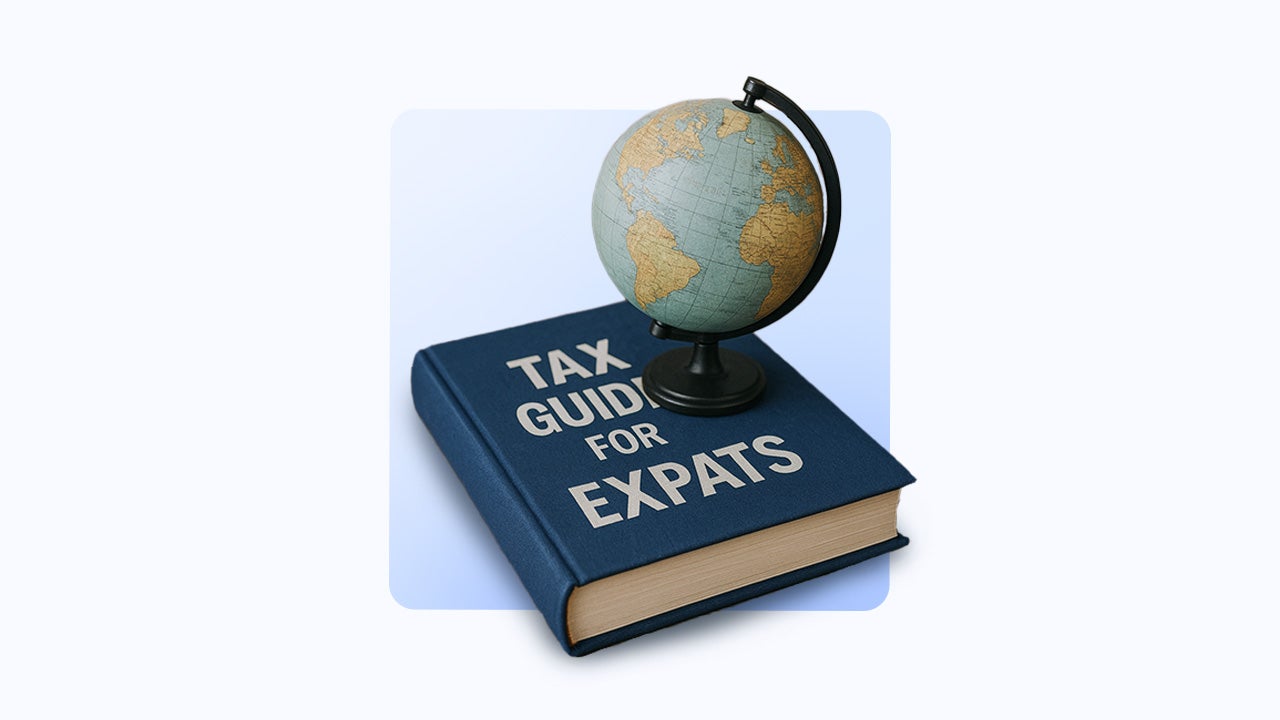Living abroad doesn’t mean you can leave your U.S. tax responsibilities behind. If you’re an American expat, the IRS still expects you to report your worldwide income — no matter where you live or work.
Here’s the good news: There are a few different tax breaks that help many expats avoid U.S. taxes altogether.
This tax guide for expats will help you understand which forms to file, what income to report and how to take advantage of key exclusions and credits so you can stay compliant and avoid overpaying.
What you should report to the IRS if you live abroad
U.S. citizens and resident aliens must report their global income — no matter where it’s earned. That means wages, dividends, interest, rental income and self-employment earnings all need to be included on your annual tax return, converted into U.S. dollars using the applicable exchange rate.
You’ll also need to file Form 1040 if your income exceeds the standard filing threshold, which is now $15,750 for single filers and $31,500 for married-filing-jointly filers in 2025. If you’re self-employed and earn $400 or more, a return is required regardless of your total income.
Beyond income, expats with foreign financial accounts worth over $10,000 at any point during the year must file a foreign bank account report (FBAR) separately from their tax return. See this IRS page on FBARs for more information.
If you own specified foreign financial assets — like foreign stocks, retirement accounts or insurance policies — with values above set thresholds ($200,000 for single filers and $400,000 for married-filing-jointly filers living abroad), you may also need to file Form 8938 under the Foreign Account Tax Compliance Act (FATCA).
See this IRS page on FATCA for more information. Other filings may apply if you have ties to foreign trusts, corporations or investment vehicles.
Tax breaks for U.S. expats
U.S. expats can take advantage of several tax breaks that help reduce or eliminate double taxation. Here are the most important ones to know for the 2025 tax year:
Foreign earned income exclusion (FEIE)
You can exclude up to $130,000 of foreign earned income from U.S. taxes in 2025. That amount doubles to $260,000 if you’re married and both spouses qualify for the FEIE. Those dollar amounts are adjusted for inflation each year.
To qualify for this tax benefit, your tax home must be abroad, and you must meet either the bona fide residence test or the physical presence test.
Physical presence test
The physical presence test is defined by the IRS as being “physically present in a foreign country or countries for at least 330 full days during any period of 12 consecutive months.”
“The physical presence test is great because it is objective — if you meet the 330-day requirement, then you get the benefits of FEIE,” says Nicolás Castillo, CPA at Rook International CPAs, which specializes in global tax strategies.
One thing many expats don’t realize is that if you don’t technically qualify for the physical presence test at the time of filing, you may still be able to claim the deduction. You’ll need to file for an extension using Form 4868 or Form 2350. You can then apply the extra time towards the FEIE.
The extension allows you to meet the physical-presence test on your first tax return even if you haven’t lived in the country for the required 330 days, as long as you will meet it in the current calendar year. Plus, you needn’t wait until you officially meet that deadline to actually file your full return.
— James Royal, principal writer on investing | Bankrate
Bona fide residence test
If the physical presence test doesn’t work for you, the other test to qualify for the FEIE is the bona fide residence test.
This test “is excellent for those with a more subjective situation,” Castillo says. “Perhaps the taxpayer has lived in Italy his/her whole life, but spends time in the U.S. for work or an extended holiday. Then there are a number of claims you must make to prove you are a true resident of the other country.”
Retirement savings and the FEIE
The foreign earned income exclusion reduces your taxable income, and that can limit your ability to contribute to U.S. retirement accounts such as IRAs. For example, if the FEIE drops your income to zero, the IRS interprets that as you having no earned income. You must have earned income to contribute to an IRA.
But keep in mind that, as noted below, if you choose not to claim the FEIE, you may be prevented from claiming it for the next 5 years.
See this IRS page on the foreign earned income exclusion for other important details, including which types of income do and don’t qualify and how the IRS defines a “foreign tax home.”
Another twist to consider: If you opt not to claim the FEIE, then you may be prevented from claiming it for the next 5 years. See this IRS page for more information.
Foreign housing exclusion or deduction
If you qualify for the FEIE, then generally you’ll qualify for the foreign housing tax break, which lets you exclude or deduct certain foreign housing costs above a base amount.
For 2025, the base amount is $20,800, and the maximum expense is $39,000, though this maximum may vary depending on where you live. Generally, the base amount is 16 percent of the FEIE exclusion amount (which is $130,000 in 2025) and the maximum you can claim is 30 percent of the FEIE exclusion. Remember, the FEIE amount adjusts each year for inflation.
Generally, the foreign housing exclusion is for people who are employed by a company, while the foreign housing deduction is for self-employed people. See this IRS page for more on the foreign housing exclusion and deduction.
Foreign tax credit (FTC)
If you pay income taxes to a foreign government, you can claim a dollar-for-dollar credit towards any U.S. taxes owed. For example, if you paid the equivalent of $10,000 in taxes to Germany, you’d get a $10,000 credit towards your U.S. taxes.
You can use both the foreign earned income exclusion (FEIE) and the foreign tax credit (FTC), but not on the same portion of income.
Expats often use both the FEIE (for the first $130,000 of earned income) and the FTC (for any excess income) to reduce or eliminate their U.S. tax burden.
“The foreign earned income exclusion is often easier to report. But the foreign tax credit is often a better mechanism for Americans in high-tax countries,” Castillo says.
While the foreign tax credit isn’t refundable, generally you can carry forward unused amounts.
“Not only does it prevent double taxation, but any excess tax carries forward to be used in a future year. Sometimes, like in France, the tax treaty enhances the FTC and allows us to use French social taxes, too,” Castillo says.
Don’t make the mistake of thinking you have to choose either the FEIE or the foreign tax credit. Think of them as working together to reduce your total tax burden.
— James Royal
principal writer on investing, Bankrate
Keep in mind that the interaction between the FEIE, the FTC and the foreign taxes you pay can get complex, especially for high-income earners in high-tax countries, so hiring a tax pro with expertise on expat issues could be a smart move.
U.S. tax benefits still apply
As a U.S. citizen living abroad, you’re still entitled to many of the same tax breaks and credits as U.S. residents, assuming you meet the requirements.
- Standard deduction: The 2025 standard deduction is $15,750 for single filers and $31,500 for married couples filing jointly. You can also choose to itemize if that provides a greater tax benefit.
- Child tax credit (CTC): Expats with qualifying children may claim the child tax credit, worth up to $2,200 per child in 2025.
- Retirement contributions: As a U.S. expat, you can still contribute to an IRA — but only if you have taxable earned income. If you use the foreign tax credit, your income remains taxable, keeping you eligible. But if you exclude all of your income using the foreign earned income exclusion, you won’t qualify to contribute, since the IRS considers your compensation $0. Choose your tax break carefully if growing your retirement savings is a goal.
To take advantage of these benefits, you must file a U.S. tax return and the appropriate forms — such as Form 2555 for the FEIE or Form 1116 for the FTC.
What are the tax deadlines for expats?
Most expats get an automatic two-month extension to file, which pushes their filing deadline to June 15. There’s a catch, however: Any taxes you owe are still due by April 15 — you’ll owe interest on any taxes not paid by the April due date.
Plus, you must attach an explanation to your tax return, stating that you qualify for the automatic two-month extension. See this IRS page for more details on who qualifies and who doesn’t.
Filing a tax extension to October 15 is also possible, but you need to request it.
Why we ask for feedback
Your feedback helps us improve our content and services. It takes less than a minute to
complete.
Your responses are anonymous and will only be used for improving our website.
Help us improve our content
Read the full article here
















